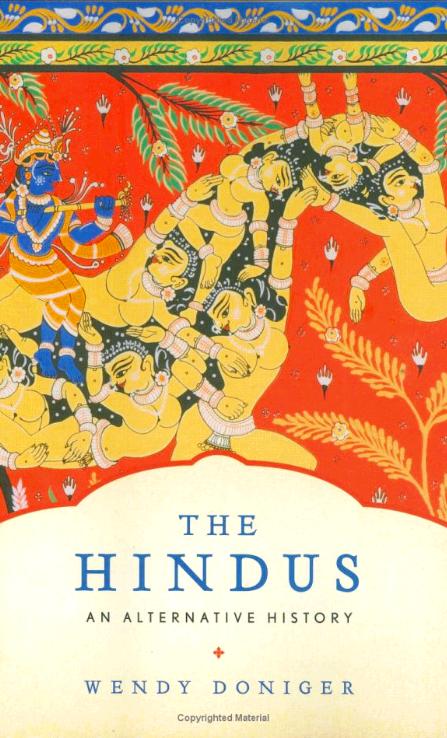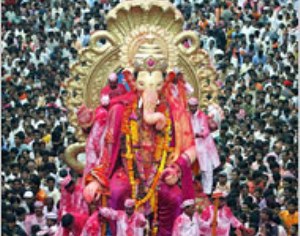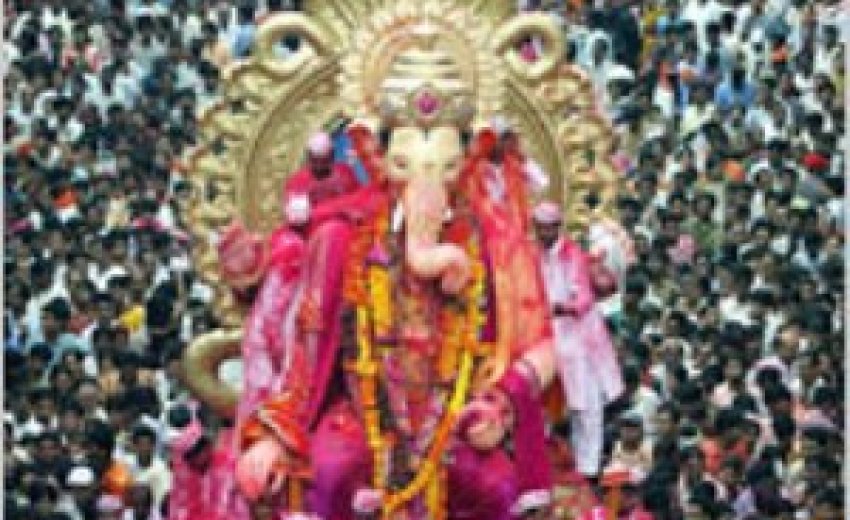Review by: MICHAEL DIRDA Any of us might make the same mistake: I didn't really notice the subtitle of Wendy Doniger's massive study, "The Hindus." I knew that she was an eminent Sanskrit scholar at the University of Chicago, author of many books about cultural, religious and folkloric beliefs, and a translator of several Indian classics, including "The Rig Veda" and "The Kamasutra".
Any of us might make the same mistake: I didn't really notice the subtitle of Wendy Doniger's massive study, "The Hindus." I knew that she was an eminent Sanskrit scholar at the University of Chicago, author of many books about cultural, religious and folkloric beliefs, and a translator of several Indian classics, including "The Rig Veda" and "The Kamasutra".
However, "The Hindus: An Alternative History" is probably too scholarly and specialized for readers looking simply for an introduction to Indian philosophy and religion....While Doniger does trace the evolution of Hinduism from the time of the Indus Valley Civilization (2,500 B.C.) to the present, she deliberately emphasizes a small number of recurrent threads, in particular the ways that "women, lower classes and castes, and animals" have endured or surmounted their traditional status. Horses, for instance, are typically glamorous, cows sacred and dogs despised -- but not always.
Having been trained as a philologist, Doniger organizes her history around interpretations of the most revered classics of Sanskrit poetry and philosophy. She begins with the Rig Veda,....This is a work so sacred that manuscripts display no textual differences: To alter a word was unthinkable. She also examines...-- essentially, meditations on the meaning of the Vedic rituals and myths -- and the 2,000-year-old Indian epics "The Ramayana" and "The Mahabharata."
Consider, for instance, the portrait of Sita in "The Ramayana." In this long poem, the beautiful Sita is kidnapped by an ogre but eventually rescued by her husband, Rama. Unfortunately, after the initial happiness of their reunion, Rama starts to wonder about his wife's chastity during her long imprisonment. Would she not have succumbed or been forced to submit to the lecherous ogre's embrace? Although Sita proves and proves again her innocence,....As Sita is the classic model of Indian womanhood, such sacrilegious speculation once led to Doniger being egged at a London lecture.
"The Mahabharata" is an immensely long poem -- seven times the combined length of the "Iliad" and the "Odyssey" -- that relates the history of the five Pandava brothers (who are all married to the same woman, Draupadi -- Doniger expresses regret that she, rather than Sita, didn't provide the template for Indian womanhood).
....According to Doniger, when Sita glimpses a golden deer encrusted with jewels, she is "delighted to find that Tiffany's has a branch in the forest." Such humor -- sometimes charming, as here -- reflects that strange desire of modern academics to be viewed not only as learned but also as hip and funky.
While deconstructing her various Indian texts, Doniger duly explores such concepts as karma ("action, or the fruits of action"); ahimsa (nonviolence); bhakti ("passionate devotion to a god"); samsara (the circle of transmigration of souls); and the caste system, consisting of Brahmins (priests), Kshatriyas (warriors and kings), Vaishyas (merchants) and Shudras (servants), as well as that fifth class, the Dalits, or so-called Untouchables. Just learning Sanskrit words like moksha (release) is an education in itself.
Doniger's last chapters are the most historical and by far the easiest. She traces the impact of the British on Indian culture and writes movingly about Kipling's "Kim," that great-hearted novel packed with colonialist attitudes yet full of the utmost sympathy and love for India and its people. She discusses Orientalism, Gandhi, right-wing Indian political groups and Bollywood, before finishing her story by touching on the reception and distortion -- Tantric sex! -- of Hindu culture in the West.
Wendy Doniger's erudite "alternative history" shouldn't be anyone's introduction to Hinduism. But once you've learned the basics about this most spiritual of cultures, don't miss this equivalent of a brilliant graduate course from a feisty and exhilarating teacher.
Michael Dirda -- [email protected]-- appears each Thursday in Style. Visit his online book discussion at
http://washingtonpost.com/readingroom.
Review by: PANKAJ MISHRA
Another Incarnation
 She writes at length about the devotional “bhakti” tradition, an ecstatic and radically egalitarian form of Hindu religiosity which, though possessing royal and literary lineage, was “also a folk and oral phenomenon,” ....And she examines the mythology and ritual of Tantra, the most misunderstood of Indian traditions.
She writes at length about the devotional “bhakti” tradition, an ecstatic and radically egalitarian form of Hindu religiosity which, though possessing royal and literary lineage, was “also a folk and oral phenomenon,” ....And she examines the mythology and ritual of Tantra, the most misunderstood of Indian traditions.
She doesn’t neglect high-table Hinduism. Her chapter on violence in the “Mahabharata” is particularly insightful, highlighting the tragic aspects of the great epic, and unraveling, in the process, the hoary cliché of Hindus as doctrinally pacifist......
...Doniger’s chapter on the centuries of Muslim rule over India helps dilute the lurid mythology of Hindu nationalists. Motivated by realpolitik rather than religious fundamentalism, the Mughals destroyed temples; they also built and patronized them. Not only is there “no evidence of massive coercive conversion” to Islam, but also so much of what we know as popular Hinduism — the currently popular devotional cults of Rama and Krishna, the network of pilgrimages, ashrams and sects — acquired its distinctive form during Mughal rule.
Doniger’s winsomely eclectic range of reference — ...begins to seem too determinedly eccentric when she discusses Rudyard Kipling, a figure with no discernible influence on Indian religions, with greater interpretative vigor than she does Mohandas K. Gandhi, the most creative of modern devout Hindus....
Yet it is impossible not to admire a book that strides so intrepidly into a polemical arena almost as treacherous as Israel-Arab relations. During a lecture in London in 2003, Doniger escaped being hit by an egg thrown by a Hindu nationalist apparently angry at the “sexual thrust” of her interpretation of the “sacred” “Ramayana”. This book will no doubt further expose her to the fury of the modern-day Indian heirs of the British imperialists who invented “Hinduism.” Happily, it will also serve as a salutary antidote to the fanatics who perceive — correctly — the fluid existential identities and commodious metaphysic of practiced Indian religions as a threat to their project of a culturally homogenous and militant nation-state.
Pankaj Mishra is the author of “An End to Suffering: The Buddha in the World” and “Temptations of the West: How to Be Modern
in India, Pakistan, Tibet, and Beyond”.

